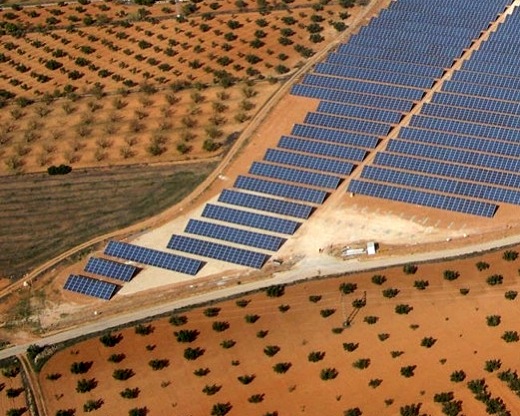 Image above: A large solar array similar inscale to KIUC project featured on useful PV site. From (http://solarbythewatt.com/2009/03/09/solar-energy-land-area-efficiency-or-how-much-acres-per-mw-kwp-per-acre).
Image above: A large solar array similar inscale to KIUC project featured on useful PV site. From (http://solarbythewatt.com/2009/03/09/solar-energy-land-area-efficiency-or-how-much-acres-per-mw-kwp-per-acre).
Kauai Island Utility Cooperative (KIUC) is pursuing the development of an approximately 10 megawatt photovoltaic (PV) project. Upon completion the project will be the largest PV facility in Hawai‘i and the largest on the island of Kauai by almost two times.
The cooperative will immediately begin efforts to obtain approval from the U.S. Department of Agriculture’s Rural Utilities Service (RUS) to reallocate up to $68 million of previously approved loan funds to construct an integrated PV and Battery Energy Storage System project on Kauai. The funds were originally approved for a 10 megawatt combustion turbine generator often referred to as “Gen X” or “CT2.”
To qualify for federal tax incentives under the Stimulus Bill and Hawai‘i state tax incentives, KIUC’s board of directors last week approved the formation of a new for-profit subsidiary, KIUC Renewable Solutions One, LLC. The for-profit subsidiary is necessary because KIUC as a tax-exempt cooperative does not qualify for the federal or state incentives. KIUC expects that up to 50 percent of the cost of the PV portion of the facility will be paid for by the incentives. The subsidiary company will be 100 percent owned and controlled by the cooperative.
“KIUC is following a model employed by other electric cooperatives, to use a subsidiary to qualify for tax incentives only available to for-profit companies. We will combine the tax credits, our own low cost financing, and the declining cost of solar photovoltaic systems to produce energy at significantly less than the cost of power generated from oil. The cost for a KIUC owned PV facility will also be lower than the recently signed Power Purchase Agreement contracts due to our lower overall cost of capital,” said KIUC president David Bissell.
A majority of KIUC’s generation today still comes from fossil fuels, but the co-op has actively expanded its portfolio of renewable technologies. KIUC now has 17 megawatts of solar PV and biomass-fired generation projects under Power Purchase Agreements. Approximately 35 megawatts of low-impact hydropower projects are being studied, but KIUC has not determined whether additional clean, renewable hydropower can be feasibly developed on Kaua i.
A Request for Proposal to contractors to build the PV facility was released this week. “We are on a very short timeline to qualify for the federal incentives,” said Brad Rockwell, KIUC manager of production. “With this facility we would have about 20 megawatts of solar PV on our system, and that is why we are integrating the Battery Energy Storage System to handle that level of intermittent resource and still have excellent reliability,” he added.
“KIUC would have more solar PV concentration than any utility in the U.S. if this project can be successfully developed,” added Bissell.
“The benefits are significant,” said KIUC board chairman Phil Tacbian. “By using the RUS approved funds for solar development, the cooperative effectively shelves the combustion turbine plant and moves closer to giving our members the clean, renewable energy they have asked for.”
The combustion turbine was originally hoped to be fueled by renewable bio-diesel, but that technology has not developed quickly enough to realistically use the RUS funds in the approved timeframe. A biomass-fired boiler at the Port Allen Generating Station was studied earlier this year, but its cost would appear to be less attractive than a solar PV facility according to KIUC’s engineering analysis.
“With wind power not feasible due to endangered species concerns, combining solar PV with the Battery Energy Storage System moves us closer to the board’s strategic goal of 50 percent renewable by 2023. If we are able to develop additional low-impact, clean hydropower later this decade, we will get there ahead of schedule,” added Tacbian.
See also: Ea O Ka Aina: Photo-Voltaic Grows on Kauai 7/21/11 Ea O Ka Aina: Solar PV to beat diesel power 5/26/11 .
2 comments :
this is a big deal, and i can only wonder why KIUC is finally now pushing for this hybrid for-profit-subsidiary model after dragging their feet for so long.
As recently as 6 months ago, Bissel was saying KIUC could not do projects like this because they could not qualify for tax credits...
WTF - over?
You bet KIUC will promote solar electricity if there is a $68,000.000.00 carrot to catch and crunch. KIUC is nevertheless headed down the right path with photovoltaics as opposed to half-baked plans for hydro power and 100% puddin' head plans for smart meters.
Hannah Brandeis
Post a Comment